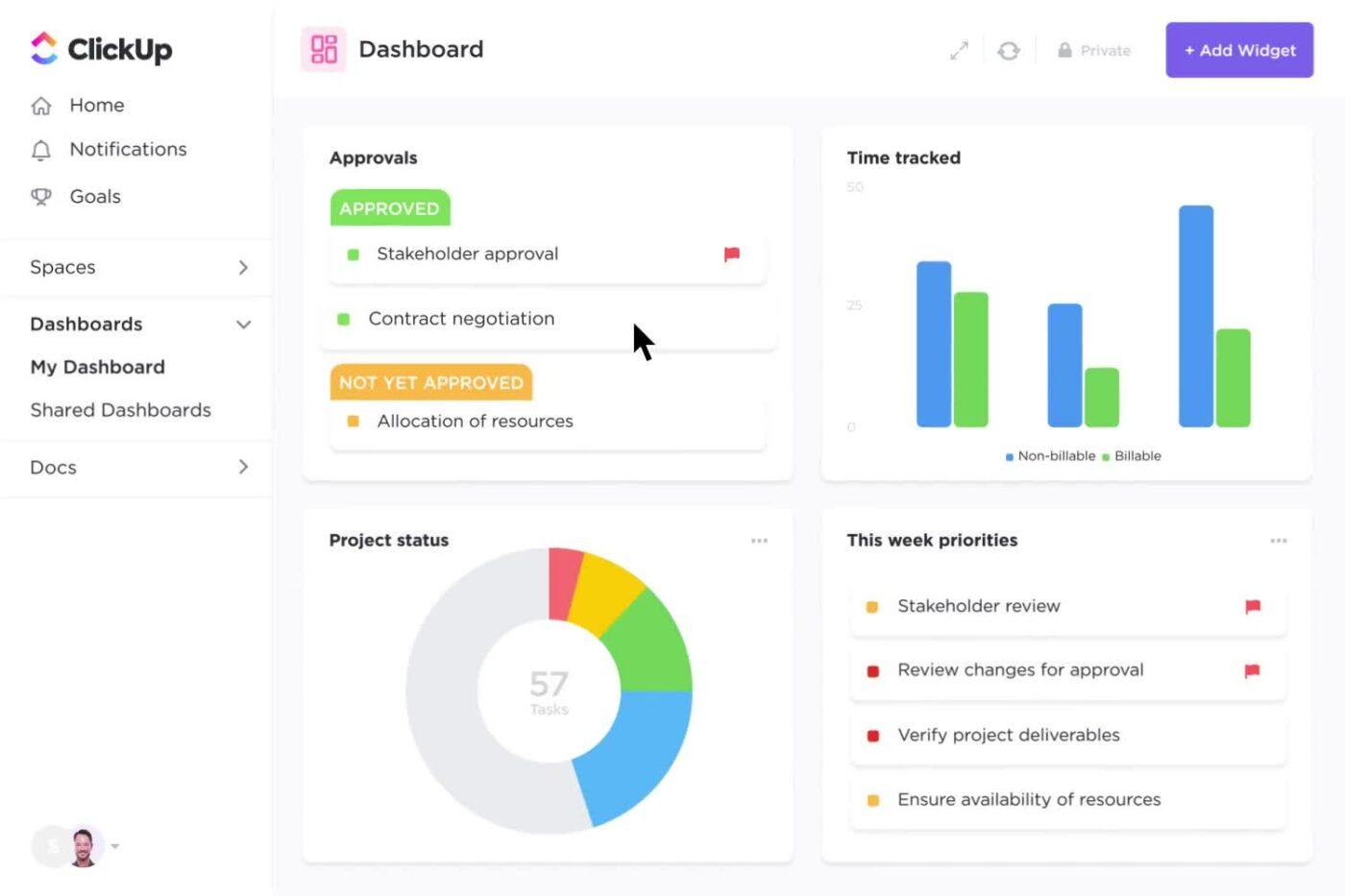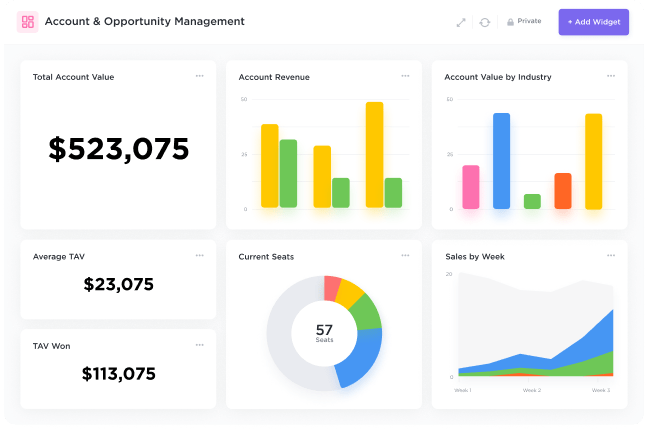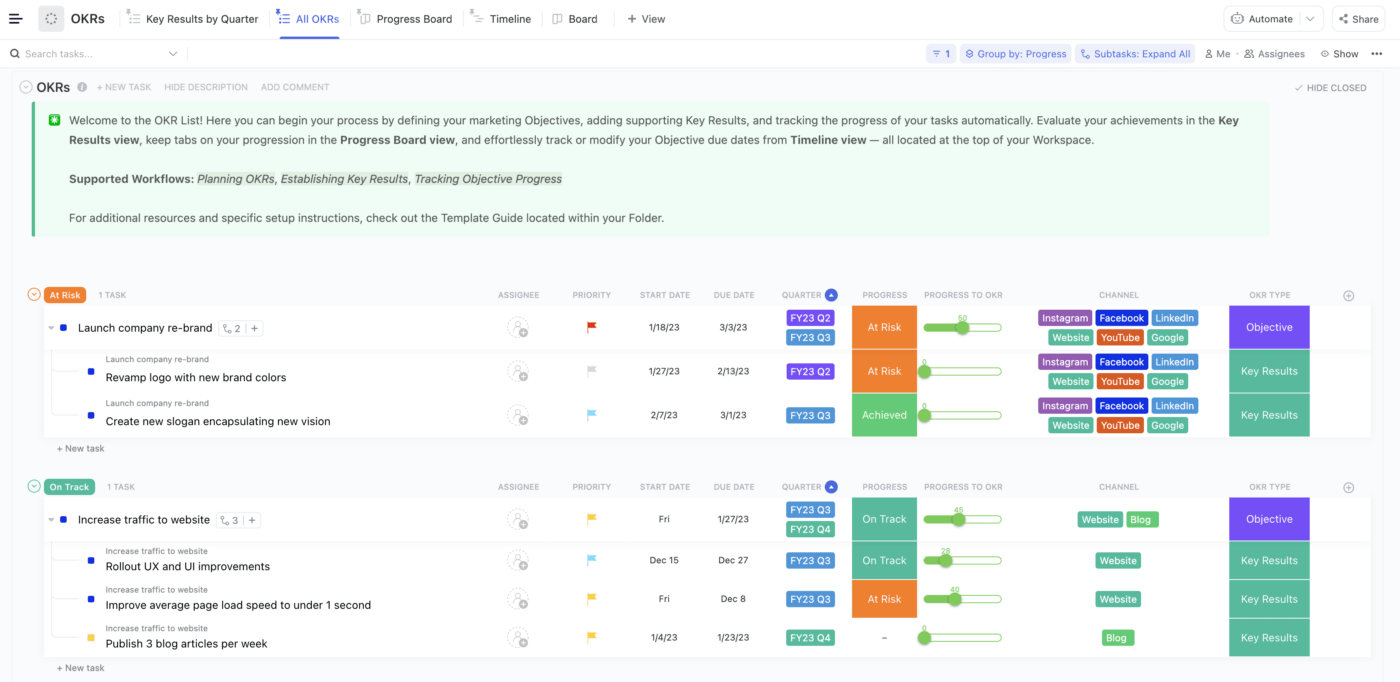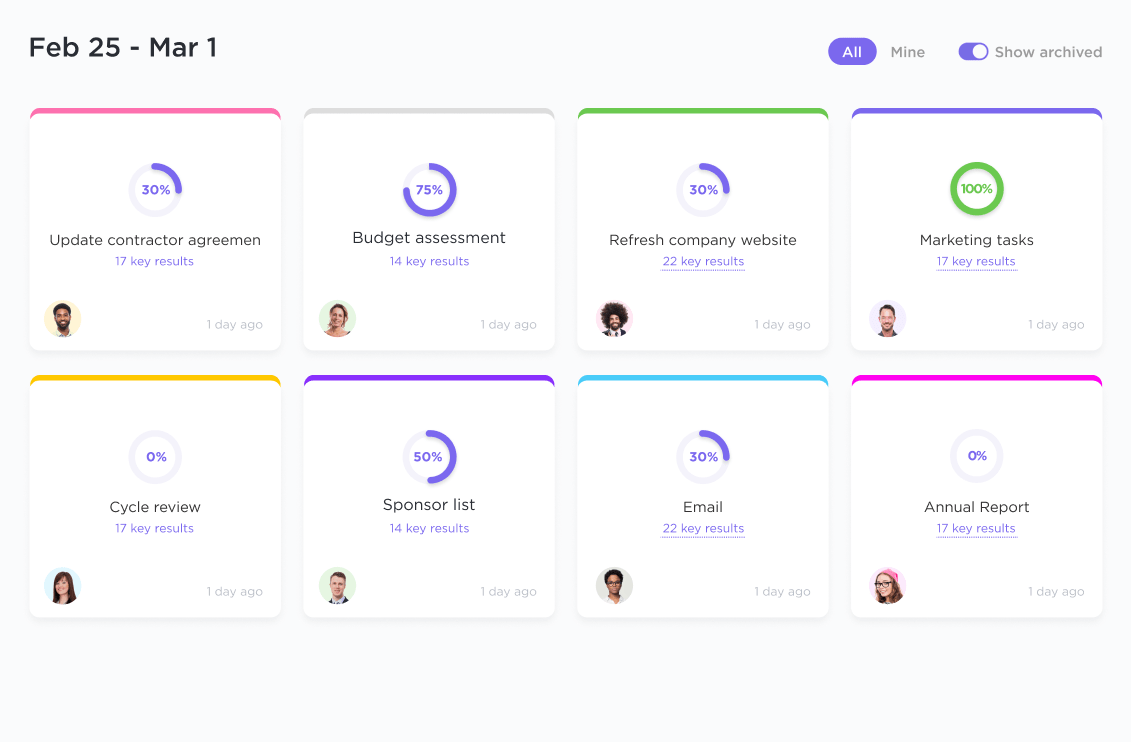As a marketer, you don’t have time to slow down and analyze every marketing effort when so many moving parts are pulling you in different directions.
With hundreds of decisions to make a day for people and projects to move forward, you need to track the right data with close eyes on marketing key performance indicators (KPIs).
As data geeks, our team got to work and pulled together the top marketing KPI examples for marketing managers to feel more confident with data-driven marketing efforts. And if you’re struggling to keep KPIs transparent and updated across the board, we know the perfect marketing KPI software that will transform how your team engages with KPIs! ✨
What Are Key Performance Indicators (KPIs)?
A Key Performance Indicator or KPI is a quantifiable business metric used to monitor progress in achieving business objectives. The KPIs you define for your team, project, or business should be linked to your core goals and objectives.
So how does a business metric become a KPI?
- If the metric tracks your performance over a non-core business process or objective, it’s a business metric
- If the metric tracks your performance over a key business process or objective, it’s a KPI
What Are Marketing KPIs?
Marketing KPIs are measurable metrics your company can track to gauge performance over channel-specific marketing activities. It proves the return on investment (ROI) about the effectiveness of marketing campaigns and strategies so the business can double down on what’s working and adjust for what’s not.
For example, a project manager is leading a new marketing campaign for a soda company. The team aligns on a refreshingly creative strategy they’ve never tried before. They could potentially add this strategy to their brand toolbox if it performs! In order to validate the success of the campaign strategy, they need clear marketing KPIs to determine their ROI. 💰
Check out our guide on marketing project management!
Why Are Marketing KPIs Important?
Marketing Key Performance Indicators (KPIs) are essential because they provide measurable metrics that allow marketers to assess the effectiveness of their strategies and campaigns. Here’s why marketing KPI tracking is essential:
- Track progress toward goals: Marketing department KPIs help teams monitor whether they’re meeting their objectives, whether it’s increasing website traffic, generating leads, improving customer retention, or boosting sales. They turn abstract goals into measurable outcomes
- Measure ROI: By tracking KPIs like Customer Acquisition Cost (CAC) or Return on Ad Spend (ROAS), marketers can determine whether their efforts are delivering value for the money invested. This is crucial for budget allocation and justifying marketing expenses
- Make better decisions: Different types of marketing KPIs provide insights into what’s working and what’s not, so marketers can make objective decisions. For example, if engagement metrics are low on a specific platform, marketing managers can use that information to adjust their content strategy or focus on platforms with better performance
- Higher accountability: Clear KPIs create accountability within the marketing team by setting expectations for specific outcomes. Team members know what they are working toward and can align their activities to achieve those targets
- Enhance alignment across teams: KPIs ensure that marketing efforts align with broader company objectives. For example, if the company aims to grow revenue, the marketing department can focus on KPIs like lead conversion rates and customer lifetime value
- Demonstrate success: KPIs provide tangible evidence of marketing’s impact on the business. When you can show how a campaign increased revenue or leads, it’s easier to justify marketing initiatives to stakeholders
- Benchmarking: Tracking marketing campaign KPIs over time allows marketers to benchmark their performance. For instance, comparing current campaign results to previous ones highlights areas of improvement or decline
Top 40 Marketing KPI Examples
Company-level Marketing KPIs
In this section, we’ll explore the key performance indicators (KPIs) that provide an overview of your company’s marketing effectiveness. These KPIs are critical for understanding how your marketing strategies impact overall business goals.
1. Marketing ROI
Marketing ROI (Return on Investment) measures the revenue generated from marketing efforts compared to their cost. It helps you understand how effective your marketing spend is.
Use data from your marketing campaigns (revenue, costs) to calculate the ROI for each campaign or the entire campaign.
ROI= (Sales revenue – Marketing cost) / Marketing cost, multiplied by 100%
Example: If a campaign costs $10,000 and generates $50,000 in revenue, the ROI is 400%. This means you earned $4 for every $1 spent.
Calculating your marketing ROI helps you determine how effective and valuable your marketing activities and channels are. Depending on your business, some marketing channels perform better than others.
2. Churn rate
Churn rate measures the percentage of customers who stop doing business with your company over a specific period. It’s a key indicator of customer satisfaction and retention.
Analyze subscription data or customer activity to track how many customers you lose over time.
Churn rate = (No. of customers lost/No. of customers at the beginning) X100
Example: If you had 1,000 customers at the start of the month and lost 50, your churn rate is (50/1000) X 100 or 5%.
3. Pipeline contribution/Revenue attribution
This KPI tracks how much of your company’s sales pipeline or revenue can be attributed directly to marketing activities. To measure it, use tools like CRM software to align marketing efforts (e.g., campaigns) with pipeline or revenue data.
Marketing contribution to pipeline = (Total pipeline from marketing / Total sales pipeline ) X 100
Example: If your sales pipeline is worth $500,000, and marketing campaigns contributed $200,000, then marketing’s pipeline contribution is 40%.
4. Traffic to MQL (Marketing Qualified Lead) ratio
This measures the percentage of website traffic that converts into marketing-qualified leads. It’s a good indicator of lead quality and engagement.
Traffic to MQL = (No. of MQLs / Total website visitors) X 100
Use analytics tools to track website traffic and lead generation forms to identify MQLs. By analyzing your traffic-to-MQL ratio, you can better understand your best-performing platforms and increase your investment there.
Similarly, if you find that one of your platforms is underperforming, you can use the data to tweak your strategy there or simply reduce your spending!
Example: If you had 10,000 website visitors and 500 MQLs, your traffic-to-MQL ratio is 5%.
5. Total leads or total revenue
Total leads track the number of potential customers generated, while total revenue reflects the monetary outcome of your efforts.
Use tools like Google Analytics, HubSpot, or Salesforce to track leads and revenue.
6. Customer lifetime value (CLTV)
CLTV estimates the total revenue a customer is expected to generate during their relationship with your company. Calculate it using purchase data and average customer lifespan.
CLTV = Average Order Value (AOV) x Purchase Frequency (PF) x Customer Lifespan (CL)
Example: If a customer spends $100 per purchase, buys 5 times a year, and remains with your company for 3 years, their CLTV is 100 X 5 X 3 = $1500
7. Conversion rate
This measures the percentage of users who take a desired action, like signing up or making a purchase. Track website visits and completed actions using tools like Google Analytics.
Conversion rate= (No. of signups/Total visitors) X 100
Example: If 10,000 people visit your landing page and 500 sign up, your conversion rate is 5%.
Bonus: OKRs vs KPIs
Content Marketing KPIs
In this section, we’ll cover KPIs that measure the effectiveness of your content marketing efforts. These metrics help you understand whether your content is engaging your audience and driving results.
8. Published marketing content
This is a simple KPI. It measures the number of content pieces—blog articles, newsletters, podcasts, social media posts, etc.—published weekly or monthly.
9. Video view counts per channel
This KPI measures how many times your videos are viewed on platforms like YouTube or social media. Use analytics tools provided by each platform (e.g., YouTube Analytics, Instagram Insights) to calculate this count.
Example: A video on YouTube gets 5,000 views, and another on Instagram gets 2,000 views. Total video views = 7,000
The rise of consumer-based mobile traffic has boosted the need (and potential!) for video marketing. Brands have the opportunity to educate and engage with consumers, and you don’t want to miss out on leads to your competitors.
Bonus: Marketing Tools for Small Businesses
10. Time on page
Time on page indicates how much time users spend on a specific page of your website. It’s a great way to assess content engagement.
To measure this, use tools like Google Analytics to track the average session duration for specific pages.
11. Organic sessions
This KPI tracks the number of visitors who find your content through organic search (e.g., via Google). You can use Google Analytics or other SEO tools to monitor organic traffic.
By focusing on these KPIs, you can refine your content strategy to create more engaging and impactful material for your audience.
Email Marketing KPIs
Let’s look at email marketing metrics that ensure your campaigns reach and resonate with your audience.
12. Open rate
This measures the percentage of recipients who open your email.
Open Rate = (Number of Opens / Number of Delivered Emails) X 100
Example: If you send 1,000 emails and 200 are opened, your open rate is 20%.
13. Unsubscribes
This simple email marketing KPI tracks the number of people who unsubscribe from your email list after receiving a campaign. Email platforms like Mailchimp track unsubscribes automatically.
14. Click-to-open rate (CTOR)
The CTOR KPI measures the percentage of email recipients who click on a link after opening the email. It’s a good indicator of how compelling your content is.
CTOR = (Total users who clicked / Total opens) X 100
Example: If 100 people open your email and 25 click a link, your CTOR is 25%.
15. Subscriber growth count
This count tracks the total number of subscribers on your email list. You can use your email marketing platform to monitor changes in list size.
Subscriber growth = No. of new subscribers – No. of lost subscribers
Example: If you gain 200 new subscribers in a month but lose 50, your net subscriber growth is 150
16. Click-through rate
This is a measure of the number of people who clicked a link in your email vs. the total number of people who received your email.
These prospects have already opened your email. You’re now determining if the email was convincing enough for them to click one of the links in it.
CTR= (Total clicks/Total delivered emails) X 100
Example: If 200 emails are delivered, and 25 clicks are achieved, the CTR is 12.5%
Marketing Operations KPIs
These KPIs ensure your marketing operations and processes are running smoothly and efficiently.
17. Conversion rate
This KPI measures the percentage of conversions from marketing activities and operations.
18. Traffic distribution
This marketing KPI tracks where your website traffic is coming from, such as organic search, paid ads, or social media. Use marketing analytics tools like Google Analytics to analyze traffic sources.
Paid Marketing KPIs
Here are some examples of performance marketing KPIs that marketing teams should track:
19. Customer acquisition cost (CAC)
CAC measures how much it costs to acquire a new customer through paid marketing efforts.
CAC=Total Marketing Costs/Number of New Customers Acquired
Example: If you spend $10,000 on paid campaigns and acquire 100 new customers, your CAC is: 10,000/100=$100 per customer
20. Cost per click (CPC)
CPC tracks the cost of each click on your paid ads. It’s a key metric for paid campaigns on platforms like Google Ads.
CPC=Total Ad Spend/Total Clicks
Example: If you spend $1,000 on ads and receive 500 clicks, your CPC is: 1,000/500=$2 per click
21. Return on ad spend (ROAS)
ROAS measures the revenue generated for every dollar spent on advertising.
ROAS=Revenue from Ads/Ad Spend
Example: If you spend $5,000 on ads and generate $20,000 in revenue, your ROAS is: 20,000/5,000=4:1
22. Quality score
This metric is used in Google Ads to measure the relevance and quality of your ads, keywords, and landing pages.
Google assigns a score from 1 to 10 based on relevance, click-through rate, and landing page experience. A higher quality score lowers your CPC, improving your campaign’s efficiency.
23. View-through rate
If you run video ads on any channel, then this is a critical marketing key performance indicator for you to track.
View-through rate tells you how many people watched a skippable video ad right till the end. This is a good indicator of how engaging your ad content is and how accurately you have targeted it to the relevant audience.
View-through rate= (Total completed views/Total measured impressions) X 100
Example: If a video ad gets 1000 impressions and 10 people watch the complete ad, the VTR will be 1%.
24. Impressions and reach
The number of times your marketing piece was displayed to a user. If you’re tracking these numbers in each native platform, use a centralized marketing dashboard to maximize your time! ⚡️

Product Marketing KPIs
25. Daily active users (DAU)
This common product marketing KPI tracks the number of unique users engaging with your product daily. Use product analytics tools like Mixpanel or Amplitude to measure it.
Example: If 5,000 unique users log into your app daily, your DAU is 5,000.
26. Net promoter score (NPS)
NPS measures customer loyalty and satisfaction by asking, “How likely are you to recommend this product to others?”
NPS=%Promoters−%Detractors
Example: If 70% are promoters and 10% are detractors, your NPS is: 70−10=60
27. Trial and demo signups
This measure tracks the number of users signing up for a trial or requesting a product demo. Use CRM tools like Salesforce to track leads.
28. Feature adoption rate
This KPI for marketing teams measures how many users are actively using a specific feature of your product.
Feature Adoption Rate= (Users of Feature/Total Active Users) X 100
Example: If 1,000 out of 5,000 users use a new feature, the adoption rate is: (1,000/5,000)×100=20%
Public Relations KPIs
29. Active coverage
This PR KPI tracks the number of media outlets actively covering your brand or campaign. Marketing teams can monitor press mentions using tools like Meltwater or Google Alerts.
Example: If 20 publications cover your press release, that’s your active coverage.
30. Share of voice
The share of voice KPI measures your brand’s visibility compared to competitors in media and public discussions.
Share of Voice= (Your Mentions/Total Mentions in Industry) X 100
Example: If your brand has 500 mentions out of 2,000 total mentions in your industry, your share of voice is: 500/2,000×100=25%
31. Media outreach
This tracks how many journalists or outlets you’ve contacted regarding your campaign. To track this effectively, maintain a log of outreach activities.
32. Potential reach
This estimates how many people might have seen your media coverage. To calculate it, multiply publication readership by the number of articles published.
Example: If 10 articles are published in outlets with a total readership of 500,000, your potential reach is 5,000,000.
SEO Marketing KPIs
Search engine-optimized content marketing strategies are one of the most reliable methods of marketing today.
You publish content on your blog about topics your audience is searching for on Google. There are things you can do to get those articles to rank high on Google search results for SEO authority. When your customers search for those topics, they’ll find your post (providing its ranking on Google page one), and they will visit your site to hopefully convert!
33. Keyword Ranking
This is a common SEO KPI that tracks how many keywords your website ranks for. Use tools like SEMrush or Ahrefs to monitor rankings.
34. Backlinking outreach
This indicates the number of brands, companies, or marketers you’re connecting with to get a backlink from quality websites to your content. As Jeremy mentioned, try creating a database to help you scale as your business grows!
Try the SEO template modeled after ClickUp’s Workspace to manage your content briefs and cross-functional work in one place.
ClickUp SEO Content Brief Template
35. SERP rankings
Your website’s/page’s position in search engine results for keywords. The higher your SERP, the better chance you have for people to find and click on your site.
With this KPI, you can track how well your article is performing for each keyword.
You’ll see how well you’re doing for various keywords and determine where your SERPs are lagging. How do you track these keywords? You could set up a SERP tracking software and monitor your rankings daily to measure performance. 👨💻
Alongside these crucial indicators, remember to watch out for these key SEO metrics too:
- Bounce rate: People who exited your site within just a few seconds of arriving
- Mobile usability: Speed and performance of your landing page on phones and tabs
- Crawl errors: URLs that are inaccessible to the Googlebot when it scans your pages
Social Media Marketing KPIs
Social media engagement is a good way to see if your content is actually resonating with your audience. You can use this info to tweak your marketing campaigns and give your customers what they want.
Additionally, engagement will highlight which of your customers are most primed to be moved into your sales funnel.
36. Follower Count
This metric tracks the number of followers your social media accounts have. You can check metrics directly on platforms like Instagram or Twitter.
Example: If your account grows by 500 followers in a month, that’s your metric.
37. Engagement Rate
This KPI measures how actively users engage with your social media content.
Engagement Rate= [(Likes + Comments + Shares) / Total Followers] X 100
Example: If your post gets 100 likes, 20 comments, and 30 shares, and you have 1,000 followers, the engagement rate is: [(100+20+30)/1,000]×100=15%
38. Impressions and Reach
Impressions track the number of times your content is displayed, while reach measures the number of unique users who see it.
Example: If your post is displayed 10,000 times to 8,000 unique users, impressions = 10,000, and reach = 8,000.
39. Mentions
This marketing KPI tracks how often your brand is mentioned on social media. Social media marketing tools like Brand24 or Hootsuite can help track mentions.
40. Social Shares
The total number of web content shares people send to their networks and connections.
Beyond these two KPIs, continue tracking other social media engagement KPIs such as:
- Brand mentions: How many other individuals or businesses are tagging you in their conversations
- Referral traffic: Number of people who visit your website from your social media (or even other sites)
- Sentiment: Engagement might be positive or negative. Sentiment marketing analysis metrics use machine learning to gauge sentiment and present scores
This comprehensive guide covers the most important KPIs across various marketing disciplines. Tracking and optimizing these metrics will help you refine strategies and drive impactful results.
📮 ClickUp Insight: 63% of our survey respondents rank their personal goals by urgency and importance, but only 25% organize them by timeframe.
Meaning? You know what matters, but not necessarily when. ⏳
ClickUp Goals, enhanced by ClickUp Brain’s AI assistance, brings clarity here. It helps you break down large goals into time-bound, actionable steps. ClickUp Brain provides intelligent suggestions for timelines and keeps you on track with real-time progress updates and automatic status changes as you complete tasks.
💫 Real Results: Users report a 2x boost in productivity after switching to ClickUp!
The Best Way to Plan & Track Your Marketing KPIs: Get ClickUp!
ClickUp is an all-in-one AI-powered work management platform where teams come together to plan, organize, and collaborate on work using tasks, Docs, Chat, Goals, Whiteboards, and more. Easily customized with just a few clicks, ClickUp lets teams of all types and sizes deliver work more effectively, boosting productivity to new heights!
Here’s a closer look at three powerful (and free!) ClickUp features to set and monitor marketing KPIs:
ClickUp Goals

In ClickUp, Goals are high-level containers split into smaller Targets and update in real-time as you make progress. These Targets are essentially your KPIs with actionable tasks to achieve results.
So how does this help you with managing marketing KPIs? You get to customize the metrics you choose to track those objectives:
- Number: Create a range of numbers and track increases or decreases between them
- True/False: Use a Done/Not Done checkbox to mark your Target complete
- Currency: Set a monetary Goal and track any increases or decreases
- Task: Track the completion of a single task or an entire List
ClickUp Dashboards

ClickUp’s case studies have found that 42% of working Americans don’t feel their employers offer all the technology tools or apps they need to succeed while working remotely. Being that you can manage all of this from a digital dashboard, it’s the perfect option for remote teams looking to amp up their marketing activities!
Dashboards in ClickUp are the perfect place to track your marketing KPIs. Anyone can build a Dashboard using the building blocks—Custom Widgets—to organize high-level overviews of marketing KPIs.
Clickup’s Marketing Templates
Choose from over 100 customizable templates to plan, execute, and track your marketing activities.

- Use the ClickUp Strategic Marketing Plan Template to break down goals, budgets, and other critical KPIs in one place.
- Create, manage, and track marketing campaigns and promotions with ClickUp’s Campaign & Promotion Management Template
- Stay on top of your SEO tasks and identify gaps in your SEO efforts with the SEO Checklist Template by ClickUp
- Quickly create high-impact press releases with ClickUp’s Press Release Template
- Manage marketing campaigns, budgets, performance, creatives, and more with the Campaign Tracking & Analytics Template by ClickUp
- Plan, track, and measure your content marketing efforts with ClickUp’s Content Marketing Plan Template
Bonus: More marketing planning templates & marketing planning software!
And with all your work in one place, ClickUp has over a dozen ways to organize and visualize tasks and other work, including:
- Assigned comments: Assign actionable items that don’t warrant a full task to team members
- Automation: Automate your repetitive processes to save time and people resources
- Custom statuses: Create project-specific and relevant statuses for your tasks
- Weekly Scorecards: Track your team’s objectives and goal progress quickly
- Priorities: Focus on the right tasks first
- AI assistance: Get AI to help with everything from summarizing meeting notes and creating blog outlines to analyzing datasets and sending progress updates!
This way, you can easily see the progress of your marketing strategy plans and track key metrics. 📈
Sign up for a free ClickUp account to build your marketing team’s best productivity and tracking system yet!






